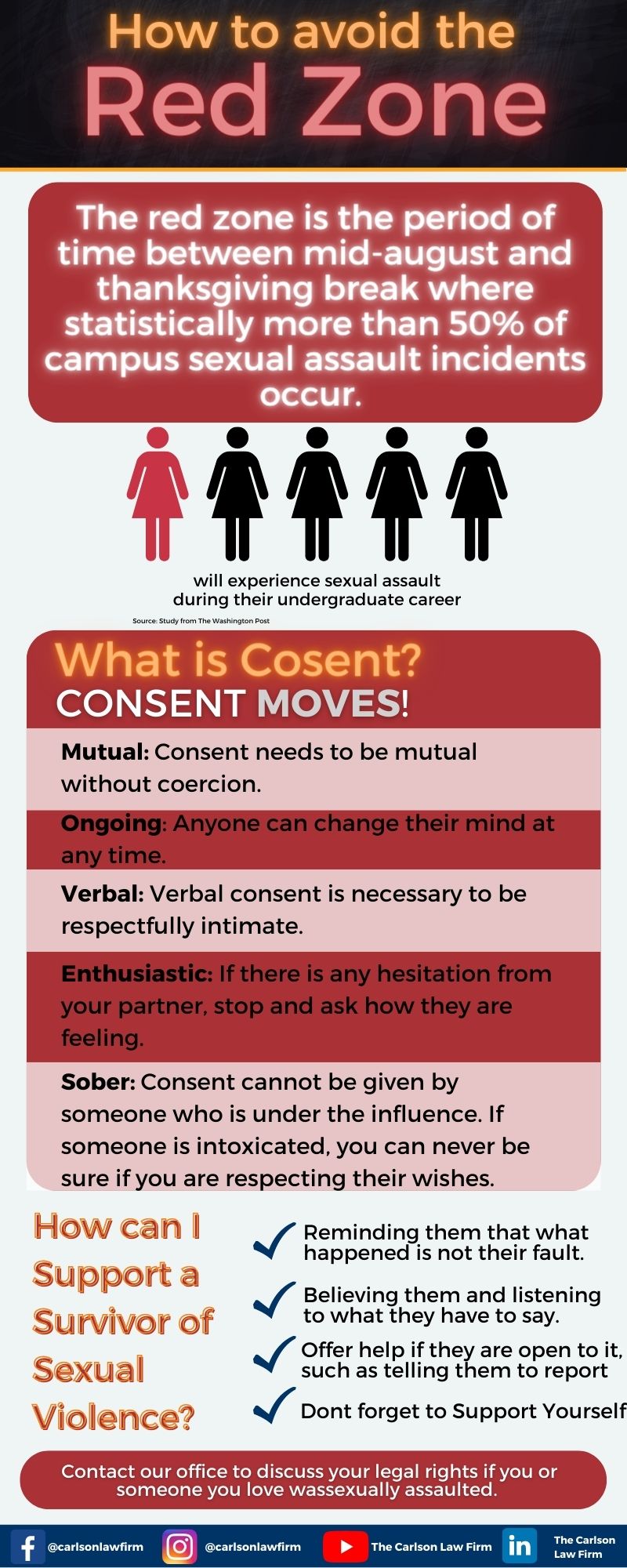The school year is quickly approaching, and many college-aged students are preparing for the late-night cramming study sessions and new experiences in college. As many ready themselves for the fall semester, it’s important to discuss the spike in campus sexual assaults that occur at the beginning of the school year.
A U.S. Department of Justice study of nine colleges found 629 sexual assaults occurred among first-year students in September and October 2014. However, it is unsurprising that the Red Zone timeframe happens at the beginning of the school year. In almost, if not all, college towns, countless parties are going across town, including greek organizations typically holding their “rush” events for students interested in joining fraternities and sororities, among many others.
What is the Red Zone?
The Red Zone is distinguished as the first 6-10 weeks time frame when many students are going to parties, gatherings, and other social events to celebrate their return to campus. Unfortunately, more than 50% of all sexual assaults occur on college campuses during the Red Zone period.
There are a number of factors that put college students at risk during this period:
- Students are away from home, maybe for the first time
- They may cope with the anxiety of starting this new chapter by using alcohol and/or drugs
- They may be inexperienced with using alcohol responsibly and moderately
- They may lack a cohesive and reliable group of friends who are committed to looking out for each other
How Does Alcohol Affect the Red Zone?
According to a Campus Sexual Assault (CSA) study, more than half of incapacitated rapes reported by college women happen at parties, and the majority of perpetrators were under the influence of alcohol. Unfortunately, it’s common for a person who commits sexual assault to push someone to drink to incapacitate them or to target someone who seems to be already under the influence. A person who is incapacitated is less likely to deny or resist unwanted sexual acts and give complete consent.
We want to stress the point that sexual assault is never the survivor’s fault. Sexual violence falls on the responsibility of the person who chooses to interact with someone’s body without consent, regardless of whether the other individual was using any substance, what they were wearing, or how they were behaving.
Sexual Violence IS Preventable
It is long overdue for society to shift how we discuss sexual assault prevention. For example, conversations regarding the topic often warn young women not to put themselves in risky spots, advising them not to get blackout drunk at parties with men who don’t have their best interest at heart. However, the conversation needs to shift to how young men conduct themselves. Sexuality should be embraced in a way that is respectful and focused on consent from both parties.
In addition, we must have conversations with all young people about being an upstander (opposite of a bystander) and not being afraid to step into situations where people may appear to be under the influence to engage in sexual behavior that is healthy, smart, and, of course, legal—even if it does seem awkward.
What Past Efforts Have Higher Institutions Made in Regards to Reducing Sexual Assault?
In an effort to slow sexual assault, colleges have tried outright bans on certain events and groups.
For example, Harvard University established a policy that would restrict a student belonging to an angle-gender organization, such as a fraternity, sorority, and the all-male final clubs, whose members were accused of misogynistic and sexually violent behavior, from holding a leadership position in a university-affiliated athletics team or group.
A less extreme effort to reduce sexual assault instances came from The University of New Mexico, which launched a social media campaign called “Reclaim the Red. ” The campaign encouraged students and staff to share the #ReclaimTheRed hashtag to bring awareness to the Red Zone. Since the campaign launch, the university has seen a number of increased reports of sexual violence since making sexual assault and bystander intervention training mandatory for all incoming students.
In addition, college campuses are making a better effort to inform and educate their student population about the resources available to them via Title IX. The office’s goal is to provide students with comprehensive information on their rights, options, and resources so that the individual can make the best decision for them.
Better Protect Yourself and Avoid the Red Zone
Just to reiterate, it is NEVER the victim’s fault for sexual assault. Victim blaming is prevalent in today’s society as many have come forward to speak about their traumatic experiences. In addition, if you have been the victim of a sexual assault, you might have even blamed yourself for what occurred. Sexual assault is never the survivor’s fault.
To protect yourself and avoid the Red Zone, it’s important to be vigilant in settings where predators may be present by following these tips:
Don’t ever leave your drink unattended, even for a moment. Leaving a drink unattended gives predators an opportunity to spike it with drugs or alcohol, which could incapacitate you. If your drink has an odd appearance or taste (like unexplained residue or a salty taste), immediately throw it out. Drinks that have lids or sports tops are a good choice as they are less easily spiked.
Trust your gut. If something about someone or the location feels weird, listen to your gut and leave immediately. You might subconsciously process body language or other danger indicators without realizing it.
Stay with your friends. Use the buddy system. You and your friends can agree that if any of you appears intoxicated, passes out, gets sick, or is having trouble walking or breathing, the other buddy will make sure they get home safely. Don’t leave someone stranded in an unfamiliar or unsafe situation. Keep your phone on you at all times in case you find yourself in an uncomfortable or dangerous situation.
Be alert of your surroundings. Regardless of the setting, it’s important to always pay attention to what is going on around you. Get to know your surroundings. If your campus has a bus or public safety escort that will walk you home at night, take advantage of those services.
How to Help a Friend Out
Chances are that when someone goes through a traumatic experience like sexual assault, they may open up to a friend for help. It is important for that person to understand that the survivor sees you as an important person in their life and trusts you with a crucial part of harm prevention. Although we can’t provide the best solutions, here are a few ways you can be a great support:
- Being a good listener and validating your friend’s experience
- Keeping it confidential
- Providing options and information
- Letting them make their own decisions and respecting their wishes
- Reminding your friend that you care
- Taking care of yourself
How Can The Carlson Law Firm Help?
Sometimes it is easier to convince yourself, “if I dress conservatively, this won’t happen to me ever again.” Or “if I didn’t drink so much, I would have been able to push off my attacker.” However, such toxic self-blame is unhealthy and unfair to you as the victim.
Nevertheless, you don’t have to go through this all by yourself. Contact our office to speak to one of our sexual assault attorneys who can help you determine if filing a civil lawsuit against the perpetrator or institution where the incident occurred is the right step.
We care. We can help.





